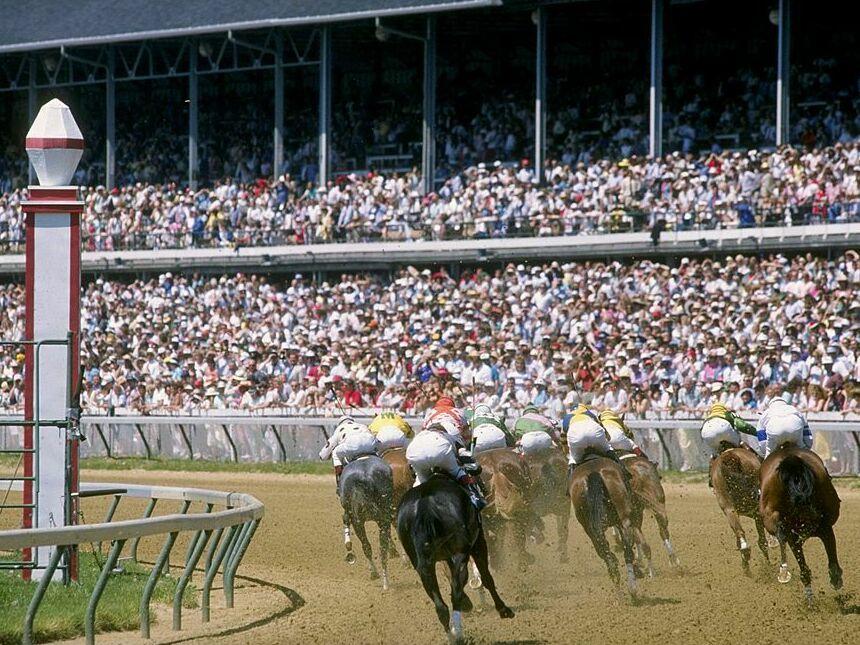Section Branding
Header Content
Larry Demeritte will be the first Black trainer in the Kentucky Derby in decades
Primary Content
You're reading the Consider This newsletter, which unpacks one major news story each day. Subscribe here to get it delivered to your inbox, and listen to more from the Consider This podcast.
1. Saturday marks the 150th running of the Kentucky Derby at the Churchill Downs Racetrack.
Crowds will cheer as the thoroughbreds thunder around a mile and a quarter track. The race itself only lasts around 2 minutes, but the tradition runs deep in America.
Excitement ramped up a few days ago as post positions were assigned to the horses in this year's race. The last horse to be called was West Saratoga – a longshot gray thoroughbred. Its owner Harry Verruchi credits veteran horseman Larry Demeritte for finding the horse, saying that Demeritte "can look to a horse and see more than normal people can see."
Larry Demeritte is a horse trainer in his 70s. In an interview with NPR's Scott Detrow, he said he's been around horses for as long as he can remember.
"My dad was a horse trainer and he put me on the horses back when I was pretty young... I know them before I know myself, and I know I wanted to be in the horse industry," he remembers.
"I said 'Well, I don't want to be a jockey because their careers don't last long. I know I'm not going to be a worker, so I have to be a horse trainer because I could do that til' I die.'"
2. Horse racing wasn't always so exclusive.
Demeritte is the first black trainer to participate in the Derby in 35 years, and the first person ever from the Caribbean to do so. Before 1989, there hadn't been a Black trainer since 1951. Black trainers, jockeys, and grooms are a rarity at the Derby these days, but that wasn't always the case.
The first Kentucky Derby was in 1875. Oliver Lewis won the first Kentucky Derby, and his horse was trained by Ansel Williamson, both of whom were Black men.
Ronald Mack is the founder of the Legacy Equine Academy, and in a Kentucky Educational Television documentary about the history of Black horsemen, he noted that 15 of the first 28 winners of the Kentucky Derby were Black jockeys, "And so there was dominance and prominence in the industry."
Black people played a key role in the early history of the Kentucky Derby, but they were forced out through Jim Crow segregation. Today, Demeritte hopes the sport can open its doors to more people:
"We need to sell our sport better than we do... We need to form more syndicates because it's getting pretty costly now to own a racehorse. It's like any other sport... car racing and all of them, they all have syndicates...so [many] sponsors. I feel like that's what we have to do to let the middle class know in America that it's not a sport of kings. Anyone can play it, and the reward is so great when you have success in it."
3. Persisting through illness.
Demeritte has faced three separate cancer diagnoses over the years, as well as a rare disease called amyloidosis. Despite struggling with his health, he says he's kept a positive outlook through his faith in God.
"I feel like I'm here for a purpose. And I think this is my purpose, the opportunity to make a difference in someone's life... Anything is possible. But you have to work at it, you know? That's the way I look at life."
He says he never lets his illness stop him from being focused on the task at hand. And looking toward this weekend, he's excited for the big day, and he's confident about West Saratoga's chances.
"When you do things you love, it's nothing tough about it. Get that smile put on your face when you see a horse train good that morning for you. And that's the good thing is Saratoga, he don't have too many bad days," he says.
"He's such a cool horse."
For sponsor-free episodes of Consider This, sign up for Consider This+ via Apple Podcasts or at plus.npr.org. Email us at considerthis@npr.org.

